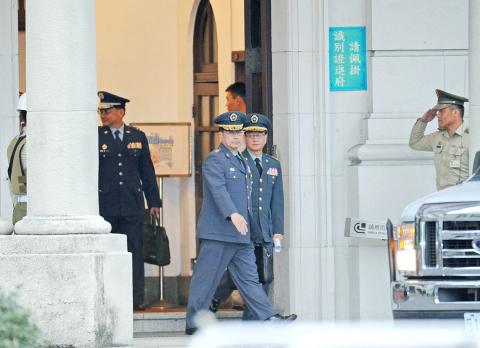President Ma Ying-jeou (馬英九) yesterday punished Chief of the General Staff Yen Teh-fa (嚴德發) with one demerit and Army Commander General Chiu Kuo-cheng (邱國正) with two demerits following an outcry over visits on March 29 by unauthorized civilians to a restricted-access base housing US-made AH-64E Apache helicopters.
According to a press release issued by the Presidential Office last night, Ma said the visit to the 601st Air Cavalry Brigade base in Taoyuan’s Longtan District (龍潭) falls under the purview of Yen and Chiu and that their “lack of supervision” demonstrated a lack of military discipline that compromised military security.
Led by Minister of National Defense Kao Kuang-chi (高廣圻), Yen, Chiu and other military officials presented a report to Ma on a recent spate of military scandals after the military conducted a review involving all units on Tuesday.

Photo: CNA
Kao offered to resign to take responsibility for the Apache incident, but Ma asked him to stay to strengthen discipline and maintain morale in the military, Presidential Office spokesperson Charles Chen (陳以信) said.
Deputy ministers of defense Liu Chen-wu (劉震武) and Chen Yung-kang (陳永康), Navy Commander Admiral Li Hsi-ming (李喜明), Air Force Commander General Shen Yi-ming (沈一鳴), Reserve Forces Command Headquarters Chief of Staff Lieutenant General Bi Hsueh-wen (畢學文) and Military Police Commander Lieutenant General Wu Ying-ping (吳應平) were also present at the meeting at the Presidential Office Building.
Earlier in the day, the ministry announced more punishments, focusing on Lieutenant General Chen Chien-tsai (陳健財), who was removed from his post as commander of the Army Special Forces Command’s Airborne Headquarters.
Taking blame for the fallout and security lapses arising from the unauthorized civilian visits, Chen Chien-tsai has been demoted and transferred to a non-supervisory post as a consultative member at the Army Command Headquarters (ACH) office.
“Chen Chien-tsai did not fulfill his responsibility as the commander in charge of the unit, and did not conduct the suitable followup work on the incident,” ministry spokesman Major General David Lo (羅紹和) said.
“Major General Chien Tsung-yuan (簡聰淵), commander of the 601st Air Cavalry Brigade, was also removed from his post, and transferred to ACH as a consultative member. If the two officers do not take up other military posts within a year, by military regulations, they will be forced to retire,” Lo added.
The Army Special Forces Command Airborne Headquarters, which was headed by Chen Chien-tsai, has direct jurisdiction over the 601st and 602nd Air Cavalry Brigade, among other specially trained elite units, including paratroopers, amphibious fighting battalions, reconnaissance helicopter and attack helicopter operation units.
The 601st and 602nd brigades, based in Taoyuan’s Longtan District and Taichung’s Sinshe (新社) respectively, are the two units responsible for the service and operation of the helicopters, the last of which were delivered in October last year.
A total of 61 Bell AH-1W Super Cobra attack helicopters, obtained from the US in arms procurement packages during the 1990s, are also deployed at these two brigades.

MAKING WAVES: China’s maritime militia could become a nontraditional threat in war, clogging up shipping lanes to prevent US or Japanese intervention, a report said About 1,900 Chinese ships flying flags of convenience and fishing vessels that participated in China’s military exercises around Taiwan last month and in January last year have been listed for monitoring, Coast Guard Administration (CGA) Deputy Director-General Hsieh Ching-chin (謝慶欽) said yesterday. Following amendments to the Commercial Port Act (商港法) and the Law of Ships (船舶法) last month, the CGA can designate possible berthing areas or deny ports of call for vessels suspected of loitering around areas where undersea cables can be accessed, Oceans Affairs Council Minister Kuan Bi-ling (管碧玲) said. The list of suspected ships, originally 300, had risen to about

DAREDEVIL: Honnold said it had always been a dream of his to climb Taipei 101, while a Netflix producer said the skyscraper was ‘a real icon of this country’ US climber Alex Honnold yesterday took on Taiwan’s tallest building, becoming the first person to scale Taipei 101 without a rope, harness or safety net. Hundreds of spectators gathered at the base of the 101-story skyscraper to watch Honnold, 40, embark on his daredevil feat, which was also broadcast live on Netflix. Dressed in a red T-shirt and yellow custom-made climbing shoes, Honnold swiftly moved up the southeast face of the glass and steel building. At one point, he stepped onto a platform midway up to wave down at fans and onlookers who were taking photos. People watching from inside

Japan’s strategic alliance with the US would collapse if Tokyo were to turn away from a conflict in Taiwan, Japanese Prime Minister Sanae Takaichi said yesterday, but distanced herself from previous comments that suggested a possible military response in such an event. Takaichi expressed her latest views on a nationally broadcast TV program late on Monday, where an opposition party leader criticized her for igniting tensions with China with the earlier remarks. Ties between Japan and China have sunk to the worst level in years after Takaichi said in November that a hypothetical Chinese attack on Taiwan could bring about a Japanese

The WHO ignored early COVID-19 warnings from Taiwan, US Deputy Secretary of Health and Human Services Jim O’Neill said on Friday, as part of justification for Washington withdrawing from the global health body. US Secretary of State Marco Rubio on Thursday said that the US was pulling out of the UN agency, as it failed to fulfill its responsibilities during the COVID-19 pandemic. The WHO “ignored early COVID warnings from Taiwan in 2019 by pretending Taiwan did not exist, O’Neill wrote on X on Friday, Taiwan time. “It ignored rigorous science and promoted lockdowns.” The US will “continue international coordination on infectious